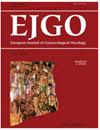Effect of neoadjuvant chemotherapy combined with intraperitoneal chemotherapy after interval tumor cell reduction on the prognosis of advanced epithelial ovarian cancer
IF 0.5
4区 医学
Q4 OBSTETRICS & GYNECOLOGY
引用次数: 0
Abstract
Objectives : To investigate the effect of neoadjuvant chemotherapy combined with intraperitoneal chemotherapy after interval tumor cell reduction on the prognosis of advanced epithelial ovarian cancer. Methods : A retrospective study was performed among 210 patients with advanced ovarian cancer who were treated with neoadjuvant chemotherapy from May 1, 2007 to December 1, 2015. 121 patients with NACT-IDS (Neoadjuvant chemotherapy followed by interval debulking surgery) were enrolled. The patients were divided into observation group (NACT-IDS + IP group, n = 28) and control group (NACT-IDS + IV group, n = 93) depending on whether intraperitoneal chemotherapy was used after interval debulking surgery. The effects of intraperitoneal chemotherapy after NACT-IDS on PFS (progression-free survival) and OS (overall survival) were analyzed and the influencing factors were explored through multivariate analysis. The competitive model was used to analyze the effect of intraperitoneal chemotherapy after NACT-IDS on tumor recurrence. Toxicities associated with adjuvant chemotherapy were also analyzed between two groups. The effect of neoadjuvant chemotherapy cycles on prognosis and the correlation between postoperative CA125 decline and recurrence were evaluated. Results : Intraperitonal chemotherapy and R0 (no gross residual) were independent factors for PFS, with HRs of 0.560 (95% CI, 0.342–0.918, p = 0.022) and 0.578 (95% CI, 0.377–0.887, p = 0.012). There was no independent factor associated with OS. Significant difference in PFS was detected among the R0 + IP group, R0 + IV group, non-R0 + IP group and non-R0 + IV group. In patients with R0 tumor reduction, IP patients showed significantly better PFS, bonferronei adjusted p = 0.036. In patients without R0 tumor reduction, no significant difference was detected between IP and IV group, bonferronei adjusted p = 0.28. There were no significant differences of grade 3–4 toxicities, abdominal pain, treatment delays, dose reductions, and treatment modifications in NACT-IDS + IP group and NACT-IDS + IV group. Neoadjuvant chemotherapy cycles ( ≤ 3 and > 3) were not the influencing factors of PFS or OS and did not affect platinum-sensitive relapse or platinum-resistant relapse. The decrease in postoperative CA125 was not related to platinum-sensitive recurrence or platinum-resistant recurrence. Conclusions : Neoadjuvant chemotherapy combined with intraperitoneal chemotherapy after interval debulking surgery could improve the PFS of patients with advanced epithelial ovarian cancer compared to intravenous chemotherapy without significant differences in toxicity.新辅助化疗联合间隔期肿瘤细胞减少后腹腔化疗对晚期上皮性卵巢癌预后的影响
目的:探讨肿瘤细胞间隔减小时新辅助化疗联合腹腔化疗对晚期上皮性卵巢癌症预后的影响。方法:对2007年5月1日至2015年12月1日接受新辅助化疗的210例晚期癌症患者进行回顾性研究。纳入121例NACT-IDS(新辅助化疗后进行间隔性减瘤手术)患者。根据间隔减瘤术后是否进行腹腔化疗,将患者分为观察组(NACT-IDS+IP组,n=28)和对照组(NACT-IDS+IV组,n=93)。分析NACT-IDS后腹腔化疗对PFS(无进展生存期)和OS(总生存期)的影响,并通过多变量分析探讨影响因素。采用竞争模型分析NACT-IDS后腹腔化疗对肿瘤复发的影响。还分析了两组患者与辅助化疗相关的毒性。评估新辅助化疗周期对预后的影响以及术后CA125下降与复发的相关性。结果:腹膜内化疗和R0(无总残留)是PFS的独立因素,HRs分别为0.560(95%CI,0.342–0.918,p=0.022)和0.578(95%CI,0.377–0.887,p=0.012)。没有与OS相关的独立因素。R0+IP组、R0+IV组、非R0+IP小组和非R0+IV小组的PFS存在显著差异。在R0肿瘤缩小的患者中,IP患者显示出明显更好的PFS,bonferronei校正p=0.036。在没有R0肿瘤减少的患者中,IP组和IV组之间没有检测到显著差异,Bonferronie调整后p=0.28。NACT-IDS+IP组和NACT-IDS+IV组在3-4级毒性、腹痛、治疗延迟、剂量减少和治疗改进方面没有显著差异。新辅助化疗周期(≤3和>3)不是PFS或OS的影响因素,也不影响铂敏感复发或铂耐药复发。术后CA125的下降与铂敏感复发或铂耐药复发无关。结论:与静脉化疗相比,间隔性减瘤术后新辅助化疗联合腹腔化疗可改善晚期上皮性卵巢癌症患者的PFS,且毒性无显著差异。
本文章由计算机程序翻译,如有差异,请以英文原文为准。
求助全文
约1分钟内获得全文
求助全文
来源期刊
自引率
25.00%
发文量
58
审稿时长
1 months
期刊介绍:
EJGO is dedicated to publishing editorial articles in the Distinguished Expert Series and original research papers, case reports, letters to the Editor, book reviews, and newsletters. The Journal was founded in 1980 the second gynaecologic oncology hyperspecialization Journal in the world. Its aim is the diffusion of scientific, clinical and practical progress, and knowledge in female neoplastic diseases in an interdisciplinary approach among gynaecologists, oncologists, radiotherapists, surgeons, chemotherapists, pathologists, epidemiologists, and so on.

 求助内容:
求助内容: 应助结果提醒方式:
应助结果提醒方式:


